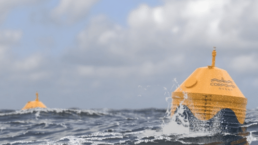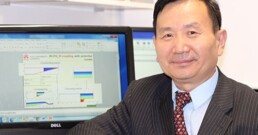Research and impact | By John Stevenson
Powering a sustainable future through wave energy
City’s of London Professor of Hydrodynamics is at the forefront of efforts to harness the potential of the oceans to create sustainable energy.
Supported by a £1M research grant from the Engineering and Physical Sciences Research Council (EPSRC) and part of UK Research and Innovation (UKRI), Professor Ma will develop the WavE-Suite, a new generation modelling package for the survivability of wave energy converters in marine environments, and assist the UK achieve to its net zero carbon emissions goal through the development of cutting-edge new wave energy technologies.
Professor Ma’s project will build on the UK’s leading role in marine wave energy to overcome challenges to devices that capture the energy generated by waves and convert it into a renewable source of electricity.
He says that there is a long history of research into wave energy converters (WECs) but cautions that “there are still many challenges to be overcome before they can become fully effective, reliable and economically viable”.

associated with a moving ocean wave into useful mechanical energy or electrical energy.

to power a more sustainable future.
One of the challenges is the lack of robust modelling tools to assess survivability of WECs under extreme marine environments that cause heavy loads and large responses. Such numerical modelling tools should have the capability of dealing with breaking waves, two-phase flow and accurately estimate the effect of viscosity in turbulent states. In the meantime, they must be fast enough so that engineers can simulate the cases within practical time-scales for design.
Assisted by Dr Shiqiang Yan, the project will develop a novel numerical modelling suite by combining different models and by proposing new numerical approaches and machine learning techniques, which will be more accurate and require less computational effort. The modelling suite will be able to automatically go up to very complex simulations only when necessary, and down to simple simulations depending on the conditions under which the WECs work.
The WavE-Suite project creates a new collaboration with leading academics from Imperial College, University of Edinburgh, University of Bath, Cardiff University, Indian Institute of Technology (IIT) Madras, Shanghai Jiao Tong University and leading WEC developers including Mocean in Scotland, CorPower Ocean in Sweden, Guangzhou Institute of Energy Conversion (GIEC) in China and BiMEP in Spain.
Professor Ma was granted the CH Kim Award by the International Society of Offshore and Polar Engineers (ISOPE) in 2016. The award was established by ISOPE in 2004 for distinguished achievement in Floating-Body Dynamics. He is the first academic from a UK university, and the second from Europe, to have received the award. He also received the 2015 Vice-Chancellor’s Award for Excellence in Learning and Teaching.